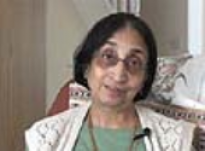Emma - Interview 14

More about me...
Emma is taking strontium ranelate and would like her GP to refer her to have a scan more frequently so that they can monitor any change.
Emma is taking strontium ranelate and would like her GP to refer her to have a scan more frequently so that they can monitor any change.
I don’t know, I haven’t, I never had chance to talk with my doctor. I will ask him again, that is he going to do it earlier or not. Because in between, a little while they, nobody did anything… about my bone scan. There was gap of long period. Hmm.
Emma was convinced that her HRT treatment was preventing bone loss.
Emma was convinced that her HRT treatment was preventing bone loss.
Using a home massager helps to ease Emma's pain and she can use at any time of the day.
Using a home massager helps to ease Emma's pain and she can use at any time of the day.
Emma's sleep is affected because of pain which leads to her feeling tired but she thinks it is important to keep active during the day.
Emma's sleep is affected because of pain which leads to her feeling tired but she thinks it is important to keep active during the day.
Emma gets headaches when she is at the gym and she is unsure what exercises she should be doing.
Emma gets headaches when she is at the gym and she is unsure what exercises she should be doing.
And because last year when I could not even hold even a glass or mug, coffee mug. My hands were so weak I could not even the glass of coffee mug. Since then my daughter told me that I should do some weight training. So I started with like ten grams, twenty grams, those weight training. And I do that even at home. And I, it helps me a lot.
Emma doesn't want to be a burden to her children.
Emma doesn't want to be a burden to her children.
Emma can no longer travel to work by train so now she drives.
Emma can no longer travel to work by train so now she drives.
Emma's GP reassured her that her vegetarian diet was a healthy and good diet for her osteoporosis. She also takes Omega 3 and cod liver oil which helps with the pain.
Emma's GP reassured her that her vegetarian diet was a healthy and good diet for her osteoporosis. She also takes Omega 3 and cod liver oil which helps with the pain.
Emma belongs to a temple where there are a lot of social activities that she gets involved with.
Emma belongs to a temple where there are a lot of social activities that she gets involved with.
Emma had a hysterectomy around 1984 and was put on HRT in 1992 after complaining of severe headaches. She also has a maternal history of osteoporosis.
Emma had a hysterectomy around 1984 and was put on HRT in 1992 after complaining of severe headaches. She also has a maternal history of osteoporosis.
Rather than giving up, Emma tries to find alternative ways of doing something she finds difficult because of her osteoporosis.
Rather than giving up, Emma tries to find alternative ways of doing something she finds difficult because of her osteoporosis.
The council where Emma works provided her with a special desk, chair and other equipment but she started having severe headaches after she was temporarily unable to use her own working space.
The council where Emma works provided her with a special desk, chair and other equipment but she started having severe headaches after she was temporarily unable to use her own working space.
What happened is that we had, the management keeps changing the section. So and I have got a special desk for my, for myself, which I have got from my, since I had my broken ribs and everything. I’ve got my special chair and a special desk. So they had to move the desk. But before they moved the desk, I moved my place. And it took nearly two to three weeks for them to move the desk. While I was sitting on somebody else’s desk, my headaches started. I started really heavy headaches. And headaches were so severe, so severe that even the painkiller could not give me any sort of relief. And if you keep on taking the painkiller then next day you cannot even open your eyes. It becomes very drowsy after, the whole day my eyes are heavy and drowsy, I cannot even open my eyes. The lights affects and everything affects them.
So then I, now I have got my desk back and luckily when I moved my desk, the same day on Friday, last Friday, I was very good. I did not have any headaches. Since last Friday I haven’t got any headache yet. So now I’m, I need to find out what is the problem of this headache which I have, I had talked to my doctor. So my doctor thinks that it is a work-related as well.

